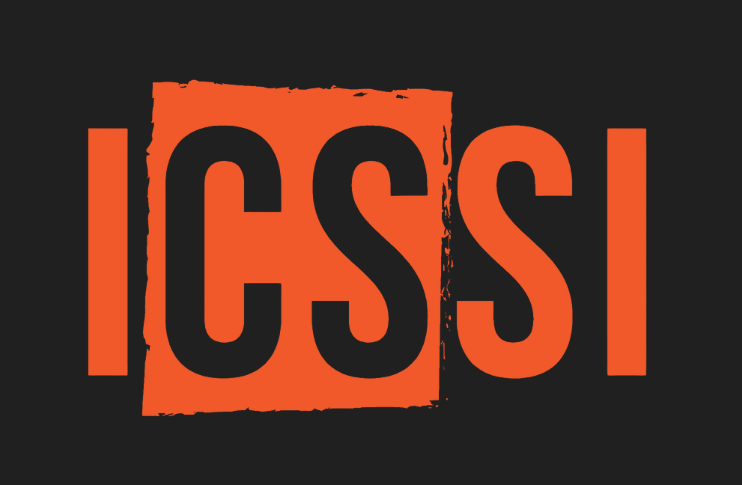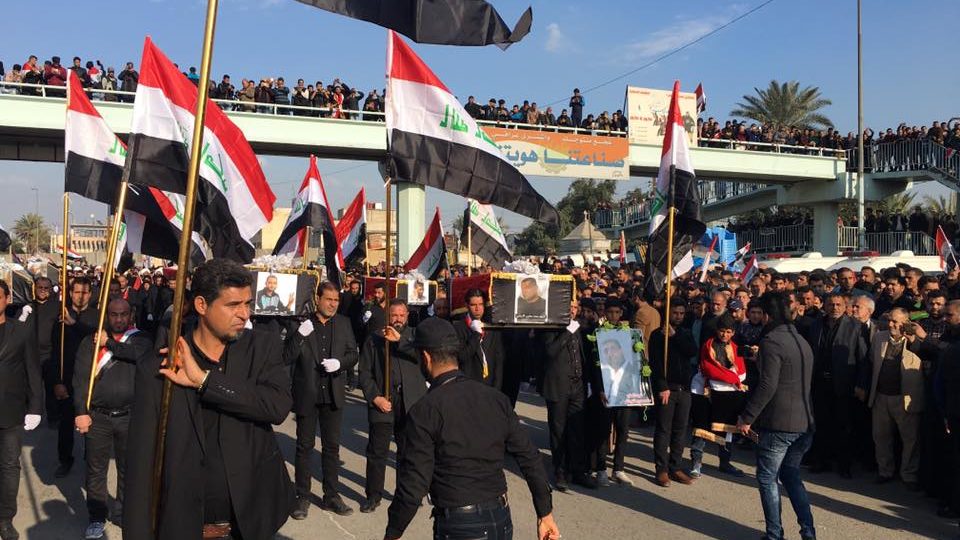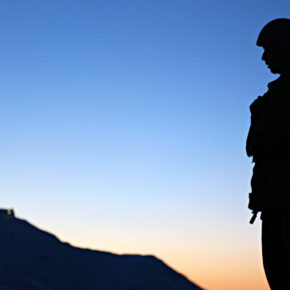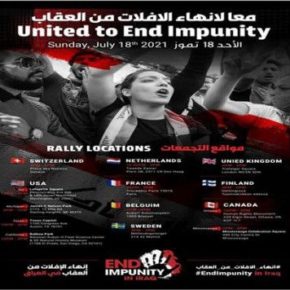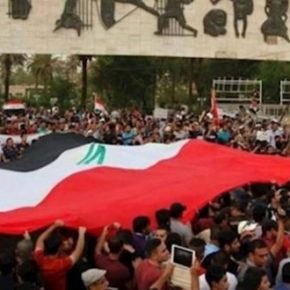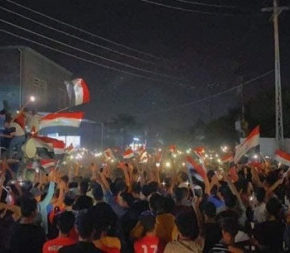Tahrir Square Victims: Martyrs of Continuous Nonviolent Iraqi Struggle
The Iraqi Civil Society Solidarity Initiative – February 20, 2017
On Saturday February 11, Baghdad, the capital of Iraq witnessed peaceful demonstrations following calls by the Shiite cleric, Muqtada al-Sadr. Thousands of demonstrators and supporters of al-Sadr together with many other civilians headed off from Tahrir Square. They were unified in demanding reform of the Electoral Commission, which they accuse of corruption and bias towards the ruling parties, especially the Dawa Party.
When the demonstrators tried to cross Al Jumhuriyah Bridge, which links Tahrir Square and the Green Zone, special governmental troops wearing black uniforms started launching tear gas at the protesters, beating them, and opening fire on them. Nine people were killed and 281 others wounded as a result of the clash. Eight of the martyrs were unarmed demonstrators; the ninth was a member of the Iraqi police force, who tried to protect the protesters from the attack by the “black-clothes forces”.
The Iraqi government later claimed there were “infiltrators” among the demonstrators who instigated the violence; while protesters accused the government special forces of causing the violence that killed the nonviolent protesters and injured hundreds more. Activists have posted photos and videos on the social networking site “Facebook” that show the Special Forces attacking the demonstrators as well as members of the army, who displayed sympathy with the demonstrators.
Despite the disagreement over how the violence began, everyone agrees that the public nature of the demonstration was nonviolent and that the martyrs who died were not involved in violence, but were victims who paid the ultimate price for nonviolent struggle seeking change and reform.
Although the history of nonviolent struggle in Iraq is filled with many, important events, the current moment looks decisive in shaping a new era of using nonviolent means to promote broad political change. The blood of the martyrs of February 11, honors this new era and makes it especially important. While the word “martyr” is largely associated with victims of violent resistance and war, or civilian victims of terrorism, today, Iraq has a very important list of the martyrs of nonviolent struggle to honor and emulate.
A significant number of the non-violent struggle leaders of the civil society and the followers of Moqtada al-Sadr who participated in the demonstration held a press conference expressing their insistent for the non-violent struggle in spite of the sacrifices and despite the fact that their lives are threatened because of this struggle.
The Madaniyoon Movement, which means “Civilian Movement”, issued a statement charging Iraq’s executive authorities with full responsibility for protecting the demonstrators and ensuring their right to peaceful protest. The Movement demanded that the authorities launch an immediate investigation into who was directing the Special Forces that killed the demonstrators. The statement stressed the need to maintain peaceful protest, regardless of the violence that had occurred.
At the same time, Iraqi cleric Muqtada al-Sadr also issued a statement calling for commitment to peaceful and nonviolent protest, regardless of the actions by security forces. Sadr rejected any deviation from a peaceful approach by the resistance, citing in his statement some of the historic nonviolence resistance figures, including Gandhi. Reference to Gandhi is rare by Iraqi leaders and has great significance, especially coming from an important religious leader like al-Sadr, at such a significant moment.
During another news conference, one member of the Iraqi parliament, Faeiq al-Sheikh Ali, accused the former Prime Minister Noori al-Maliki of being behind the attacks on the demonstrators. He described al-Maliki as having great interest in retaining the current Electoral Commission because it is controlled by his political party, and went on to accuse al-Maliki of opposing the peaceful protest movement for years.
At a later event, nonviolent demonstrators celebrated and honored the martyrs in a symbolic funeral procession which traveled from the Neurosurgery Hospital in Baghdad to Tahrir Square. Protesters carried symbolic coffins inscribed with the names of the February 11 martyrs. They also carried a coffin of the martyr Hadi al-Mahdi, in an important sign of their dedication to continuing the nonviolent struggle. Hadi al-Mahdi was assassinated in his house, in 2011, during violent operations to liquidate the civil society leaders of demonstrations in Baghdad; at the time, followers of the former Prime Minister Noori al-Maliki were accused of being behind al-Hadi’s killing. Although al-Maliki is no longer Prime Minister, the demonstrators still consider him responsible for sending infiltrators to harass and intimidate the demonstrators; they believe he instructed the “black-clothes forces” to attack the demonstrators causing the deaths on February 11.
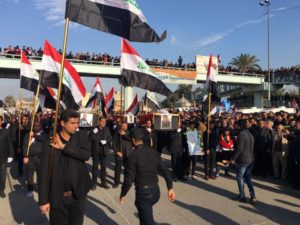
The protesters managed to complete the symbolic funeral in a peaceful manner, adhering to special instructions issued by the committees overseeing the event. The instructions specified the place and time for the funeral procession and included 10 important guiding principles for nonviolent conduct. For example:
- “Full cooperation with our brothers in the security forces; we will not be dragged by any provocation into an arena of violence”.
- “Peace and nonviolence is our approach to protest; we will never abandon these concepts whatever it may cost us”.
- “Cheer the name of Iraq only, and do not carry a banner or photo of any individual; carry only the Iraqi flag”.
Although the focus has been largely on Baghdad and the followers of Moqtada al-Sadr since the incident, there is a great solidarity with the protest movement in many areas of Iraq. Basra saw a large solidarity demonstration organized by the Mostamiroon Movement.
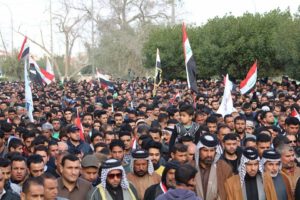
Also, a number of cities in southern Iraq organized symbolic funerals for those whom they called the “Martyrs of Reform”. Social networking site pages contained numerous solidarity messages from activists in the west and north of Iraq. One civil rights activist from the city of Hit, in Anbar province, Ahmed Abdul Salam, wrote that, “the killing of peaceful demonstrators is not a reckless act, but a systematic and deliberate act aimed to shuffle the cards. It demonstrates the inability of the powerful forces against nonviolent resistance.”
As usual, media reports focused on the launch of mortars into the Green Zone, which followed the attacks on the peaceful protesters and did not emphasize the protesters’ goals. Fortunately, the limited attack did not cause any more deaths. While it may have been intended to derail the nonviolent protests, the mortar launch was an isolated incident apparently carried out by a small group engaged in violent backlash. All the evidence, including the statements of the nonviolent movement leaders following the attack, emphasize rejection of such violence and a desire to continue the strategy of nonviolent actions to achieve their objectives.
Explaining the current focus of the protests on the demand to change the Electoral Commission, Jassim al-Hilfi, one of the civil society protest leaders, explained that the protests initially had three demands: 1. Reform of the political system, 2. Combating corruption, and 3. Provision of services. After the government backtracked on its commitment to those demands, however, the protest movement now aims to bring about change through the upcoming elections. (Provincial elections will take place next September, followed by general elections in 2018.) But the powerful ruling parties are trying to maintain power through their influence on the Electoral Commission and by imposing a law that favors the powerful parties. Therefore, the protest movement shifted its top priority to demanding change of the Electoral Commission in last week’s protests.
These developments come following a long progression of Iraqi nonviolent protest which culminated in April last year when protesters occupied the Iraqi parliament building and secured promises of reform and radical change from government officials. The protesters then retreated. But now that the promises were betrayed, the protesters see the need to elect fundamentally different members of government.
The United Nations Assistance Mission office in Iraq [UNAMI] issued a statement condemning the attack on the demonstrators. The current head of the Iraqi government, Prime Minister Haider al-Abadi, promised to investigate all those who were responsible for the attack. At the same time, the Citizenship Association for Human Rights has registered a legal complaint against the Iraqi government and the Iraqi security forces, in the Iraqi Human Rights Commission, due to the use of firearms against peaceful demonstrators leading to the indiscriminate killing of nine civilians. The Association announced that it will also present a complaint to the Prosecutor.
The Iraqi Civil Society Solidarity Initiative [ICSSI] believes the Iraqi government and the international community today face a major responsibility: to hold those responsible for killing the peaceful demonstrators accountable for their crimes. Going forward, they have a responsibility to protect all protesters engaged in nonviolent struggle, to ensure the protesters have the necessary space and opportunity to freely express their demands for change. This is the way to create a true alternative to violence as a means for change in a country ravaged by war and violence for more than four decades.
